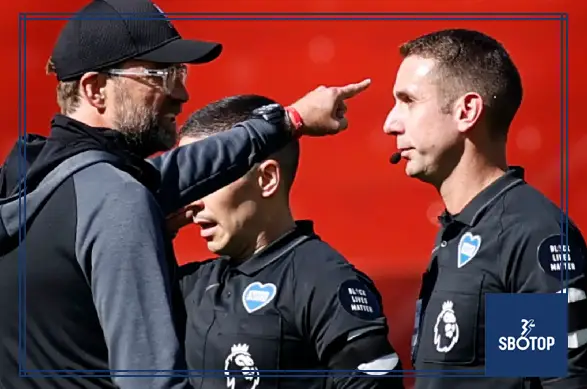In the modern era of football, the intense spotlight on referees has rarely been greater. Every decision they make is scrutinized by millions of fans, pundits, and former players, magnified by social media and instant replays. Recently, a controversial video involving Premier League referee David Coote insulting Liverpool manager Jürgen Klopp surfaced online, stirring a fierce reaction from fans, media, and football authorities alike. But amid the outrage, a former referee has come forward, asserting that the public reaction was excessive and urged a more measured perspective on the incident.
This article delves deep into the background of the controversy, the leaked video’s contents, the public and institutional responses, and the former referee’s arguments for why the backlash may have been disproportionate.
The Incident What Happened with David Coote and Jürgen Klopp
David Coote, a well-respected Premier League referee known for his composure and experience in top-flight football, found himself at the center of a storm after a private video leaked online. In the footage, Coote is heard making disparaging remarks about Jürgen Klopp, the charismatic and successful Liverpool manager.
The remarks, which were not intended for public consumption, included unflattering language and criticisms of Klopp’s behavior and management style. Given Klopp’s stature as one of the most influential figures in English football and his enormous fanbase, the leak caused an immediate uproar.
The video raised questions about referees’ impartiality, professionalism, and the boundaries of private speech. Fans of Liverpool were particularly incensed, feeling that Coote’s comments reflected personal bias that could affect his on-field decisions. Critics argued that such behavior undermines the integrity of refereeing and fuels divisions between clubs and officials.
The Fallout Public Outrage and Media Frenzy
Once the video spread through social media platforms, reactions were swift and vehement. Liverpool fans called for disciplinary action against Coote, with many demanding he be removed from officiating matches involving Liverpool or even suspended altogether. Football pundits debated whether the remarks, though made in private, compromised Coote’s ability to remain unbiased during games. The English Football Association (FA) and the Professional Game Match Officials Limited (PGMOL), responsible for referee appointments and discipline, issued statements acknowledging awareness of the video and vowing to investigate the matter thoroughly.
Media outlets extensively covered the story, analyzing the potential repercussions for Coote’s career and Liverpool’s relationship with match officials. Opinion pieces were divided; some defended Coote’s right to private expression, while others emphasized the professional standards expected of referees.
The Former Referee’s Perspective A Call for Restraint
Amid this tempest, a former Premier League referee—who requested anonymity for this commentary—spoke publicly to provide context and caution against what he viewed as an overreaction.
According to the ex-official, while the remarks in the video were indeed inappropriate and unprofessional, the level of public condemnation was disproportionate to the incident’s nature. He emphasized several key points:
- Private Comments Versus On-Field Conduct
The former referee noted that referees, like anyone else, have personal opinions and frustrations, especially when dealing with high-pressure roles. “We are human, and sometimes things are said in private that we wouldn’t want publicly aired,” he explained. “What matters most is their on-field behavior, and there is no evidence to suggest that Coote’s officiating has been biased against Liverpool or Klopp.”
- The Culture of Social Media Outrage
He warned that social media often amplifies negative reactions, creating a mob mentality that leaves little room for nuance. “The court of public opinion can be harsh and unforgiving,” he said. “Referees are already under immense pressure, and these leaks only add to the strain without necessarily reflecting their professional integrity.”
- The Importance of Internal Processes
The former official praised the FA and PGMOL for their handling of the situation, emphasizing that established internal disciplinary processes exist precisely for such scenarios. “It’s important that investigations are thorough and fair, rather than driven by headline-grabbing outrage,” he noted.
- The Broader Context of Referee Scrutiny
Referees are scrutinized in ways no other professionals in football are, he added. Every decision is dissected, and mistakes are remembered more than good calls. “This kind of incident, while unfortunate, should be put in perspective within the broader context of refereeing challenges.”
Why the Reaction Was Understandable — But Still Excessive
While the ex-referee’s call for calm is reasoned, the public’s frustration is also understandable.
Jürgen Klopp is a beloved figure in football, renowned for his passionate approach and success with Liverpool, including Premier League and Champions League triumphs. His fans have often felt that referees have treated Liverpool unfairly in the past, and this video appeared to confirm their suspicions of bias.
Moreover, football fans today demand transparency and accountability from referees, and any indication that a referee harbors ill will toward a club or manager is met with skepticism.
However, the balance between holding officials accountable and respecting their privacy is delicate. Public condemnation without due process can damage reputations unfairly and undermine trust in the game’s officiating.
Historical Precedents and Lessons Learned
This is not the first time that referees’ private comments or off-the-pitch behavior have caused controversy. History offers several lessons:
- In 2013, a well-known referee faced suspension after private messages criticizing a club were leaked.
- Referees across leagues have occasionally been caught expressing frustration or negative opinions in private chats or interviews, leading to public debates about professionalism.
These precedents highlight the ongoing tension between referees’ human nature and the high standards expected of them. They also underline the importance of confidentiality and structured disciplinary mechanisms to handle such breaches.
The Psychological Toll on Referees
Referees operate under immense psychological pressure. Every decision, right or wrong, can provoke furious reactions from players, coaches, fans, and media. Many face verbal abuse and threats, especially in the age of social media.
This environment can cause stress and frustration, which may sometimes leak into private comments. The leaked video involving Coote serves as a reminder of the human side of officiating, and the need for support structures to help referees cope with these demands.
The Role of Education and Professional Development
In light of such incidents, governing bodies have increasingly emphasized education and mental health support for referees. Professional development programs now include training on managing emotions, media relations, and maintaining professionalism both publicly and privately.
Some experts argue that such programs should be expanded to address the challenges posed by modern digital communication, helping referees understand the potential consequences of private remarks becoming public.
Could This Incident Impact Coote’s Career
David Coote’s future in refereeing depends largely on the findings of official investigations. While the leaked remarks are certainly a black mark, his overall record and professional conduct will be weighed.
Historically, referees who have faced similar controversies have sometimes been suspended or removed from high-profile matches, but outright dismissal is rare unless there is evidence of actual bias affecting match outcomes.
If Coote publicly apologizes and demonstrates commitment to professionalism, the incident may serve as a learning moment rather than a career-ending scandal.
Jurgen Klopp’s Response and Public Relations
Klopp himself has remained relatively diplomatic in public statements about the incident, emphasizing respect for referees and the challenges they face. This stance has helped diffuse some tensions, though fans remain divided.
Liverpool’s club management has also refrained from escalating the issue, signaling confidence in the FA’s disciplinary process.
What This Means for Football Governance
The incident raises broader questions about football governance and referee accountability. Transparency is crucial to maintain trust, but so is fairness in handling sensitive situations.
The football community continues to grapple with how best to balance privacy, professionalism, and public interest in an era where private moments can quickly become global news.
Fan Responsibility and Sportsmanship
Fans play a key role in shaping the atmosphere around such controversies. While passionate support for clubs is natural, personal attacks and excessive vilification of referees can create a toxic environment.
Promoting respect and understanding, even when disagreements arise, is essential for the sport’s health.
Also Read:
- SBOTOP Victor Osimhen Faces Pivotal Choice: Two Clubs Vie for Striker Amid Napoli Exit Talks After Galatasaray Success
- SBOTOP: Joshua Kimmich’s Candid Take on Germany’s ‘Bitter’ Loss to Portugal in Nations League Exit
- SBOTOP: Newcastle Target James Trafford as Eddie Howe Rethinks Nick Pope’s Role in Surprise Transfer Move










